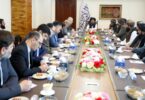CARL YONKER / CHRISTOPHER SOLOMON
The violent struggle for Syria continues after a decade of conflict that has wrought unspeakable destruction, displacement, and death. Approaching ten years, the conflict shows no signs of abating and Syrians enter the new year confronting new challenges to their very survival having endured the effects of a global pandemic and worsening economic crisis. Despite numerous setbacks, the political organization that has dominated the country since March 1963, the Arab Socialist Ba’ath Party, continues to control Syria’s political and social soul, its quest to maintain and expand its dominance having primarily played out in the background. The Ba’ath has long been described as a hollowed-out political organization bereft of ideology and relevance within the broader scope of Syria’s authoritarian politics. Yet, although its social and political preeminence has been challenged and diminished over the last decade, the Ba’ath Party remains one of the regime’s most effective institutions and mechanisms through which it maintains its authoritarian grip. The process by which the ruling party has worked to resuscitate itself is a key factor in Assad’s survival, beyond security forces, and militias. Social and Political mobilization remain vital pillars of regime survival as it navigates war, sanctions, currency collapse, a bread crisis, and a global pandemic.
CONSOLIDATING POLITICAL POWER
Since early 2018, the Ba’ath has labored to rebuild its institutions in areas formerly held by rebels while consolidating its presence in regime-held territories. These efforts were apparent when the party reasserted its social and political control through local elections held in September 2018, the first since 2011. The election, which the Ba’ath helped organize, served as a mechanism to reward Ba’ath loyalists by promoting them to positions of power and ensuring the party’s ascendency in local administration. Ba’athist lists ran unopposed in some localities, while in others the Ba’ath’s control of drawing up electoral lists enabled it to curtail the potential influence of other party’s within the Ba’ath-led National Progressive Front (NPF). This ensured that the Ba’ath’s candidates would take a commanding lead, a move that enraged the Syrian Social Nationalist Party (SSNP) and prompted it to withdraw its candidates in Homs and Suweida from the NPF list.
A little more than a year later, in February 2020, the Ba’ath held internal elections to select its leadership throughout Syria in which it rewarded “loyalists” by promoting them to positions of power. In the months preceding party elections, ranking party members spoke on a number of occasions of the necessity of removing so-called “grey members” (al-Ramadiyyin), members who had not demonstrated sufficient loyalty, from the party’s leadership. Internal elections aimed to consolidate support for the regime and Assad by “democratically” weeding out these so-called “grey members.” Several party branches objected to the results and accused central leadership with interfering to ensure “more loyal candidates” were elected. The party leadership appeared to back down initially, but the protests ultimately failed to alter the outcome.
National parliamentary elections in July 2020 saw the Ba’ath further consolidate its political power. While the party’s electoral victory and dominance in parliament was expected, the extent to which the Ba’ath would secure its share of seats in Syria’s legislative body was not. Having postponed the election several times before settling on the July date, political maneuvers by the Assad regime indicated the Ba’ath was determined to undermine any rising NPF candidate it deemed a threat. By the start of 2020, the Ba’ath had curtailed two SSNP factions, the reformist-minded Intifada faction, and the Rami Makhlouf-backed Amana faction, but allowed the Beirut-based Markaz faction’s activities to continue unabated on the battlefield and in parliament, where it held seven seats. The Ba’ath eventually excluded a large number of SSNP members off NPF electoral lists; only three secured seats in the new parliament in July 2020. Official results showed the NPF won 177 out of 250 parliamentary seats; of the 177 seats, at least 160 were Ba’ath Party members, growing its total share. The election results delivered a warning to former Ba’ath Party members and supporters of a cross-sectarian government who were increasingly turning to other pro-regime parties.
COMMANDING POPULAR SUPPORT
By focusing on its internal organization and its political dominance, the Ba’ath’s attentiveness has succeeded in strengthening its social bases of support within Syrian society. The Ba’ath has paid particular attention to maintaining its control of workers unions, such as the General Federation of Trade Union Workers and the General Federation of Peasants, among others, to bolster the party’s and the regime’s influence and curtail independent activism. Senior Ba’ath party officials not only serve as the leaders of most of these associations, but these associations contribute to the regime’s patronage networks; the General Federation of Peasants has been used “to promote patronage and clientelist networks by favoring peasants and farmers loyal to the Federation and the Syrian government more broadly.” The scholar Joseph Daher noted that the Ba’ath had worked to weaken and marginalize unions and professional associations in the early 2000s while it pursued liberal economic policies. This changed with the outbreak of the war as these unions gained new importance as a potential, though ineffective, source for pro-regime mobilization.
The Ba’ath has also endeavored to establish itself among Syria’s youth to bridge the gap between it and the party’s older generation and reinvigorate the party. On the anniversary of the Ba’ath’s founding, an editorial in the official daily al-Ba’th mused that younger members must be inspired and remember the Ba’ath’s history in order to confront the challenges facing the country today, noting that it is the responsibility of older Ba’athists to inspire and to renew the meaning of the party’s history in the present. Party cadres are active in Syria’s universities and have previously used the universities as recruitment centers for the party’s militia. Further, the party leadership has searched for ways to mobilize youth and the various youth organizations it controls, such as the National Union of Students, Revolutionary Youth Union, and the General Sports Union, to serve roles At a July 2020 meeting of the National Union of Syrian Students, Hilal al-Hilal, the Ba’ath’s assistant general secretary, praised the youth as “role models” for defending the universities. Hilal has been instrumental in using the party to implement the regime’s policies and enforce security at the local level and act as a political emissary to allies abroad.
Most recently, the Ba’ath and the Syrian regime have worked to exert their control over Syria’s official religious institutions. The Ba’ath succeeded in preventing the election of any Sunni religious elite to the parliament, and in December 2020, Assad indicated in a speech on the role of Islam in society that the Ba’athist state best represents Islam. Thus, Ba’athist, state-led Islam provides proper religious interpretations that form the moral foundations of Syrian society as opposed to other interpretations of Islam, like those of the rebels, that have undermined Syria’s security and social cohesion. Furthermore, Assad’s December speech and the speech by Syria’s Minister of Religious Endowments, Muhammad Abd al-Satir al-Sayyid, made it clear that the Ba’ath seeks to promote its Arab nationalist credentials once again, even going so far as to directly attack Syrian nationalism. Sayyid’s words provoked a strong rebuke from the SSNP but the message is clear: The extent to which any Syrian nationalist notions will be tolerated by the Ba’ath is limited to whether they are aligned with the Ba’ath’s current definition of Arabism.
While the Ba’ath has hemorrhaged grassroots support over the course of the last decade and many Syrians abhor and resent the party and its continued dominance of the country, the Ba’ath Party’s hold on power appears to be growing tighter. To be sure, the regime does not control the entire territory of Syria and would not have survived without the support of Iran and Russia. Yet, barring an Iranian or Russian withdrawal of support from the regime, the Ba’ath party will continue to march on and reassert itself as a key pillar of Bashar al-Assad’s authoritarian rule.
Dr. Carl Yonker is a lecturer in the Department of Arabic and Islamic Studies at Tel Aviv University. He is the author of The Rise and Fall of Greater Syria: A Political History of the Syrian Social Nationalist Party, forthcoming in May 2021 with De Gruyter. Follow him on Twitter: @IsmiFallah
Christopher Solomon is a defense analyst, a contributor for the Economist Intelligence Unit, and Co-Editor at Syria Comment. His book In Search of Greater Syria: The History and Politics of the Syrian Social Nationalist Party is forthcoming in June 2021 with I.B.Tauris/Bloomsbury. Follow him on Twitter: @Solomon_Chris
Courtesy: (carnegieendowment.org)






